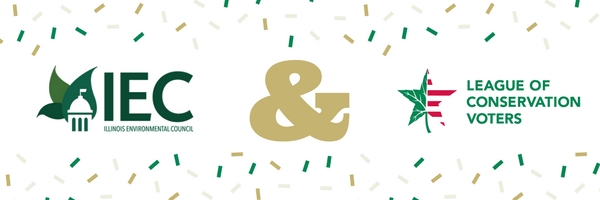
Innovative Partnership to Hold Elected Officials Accountable
and Elevate Environmental Issues
Protecting Illinois’ environment is the focus of a new partnership launched today between the Illinois Environmental Council and the League of Conservation Voters (LCV). This partnership will be used to hold decision makers accountable, put environmental issues front and center in the electoral process, and change the political dynamics that shape environmental policy in Illinois.
“The Illinois Environmental Council has been working to protect Illinois’ environment in our state capitol since 1975. Partnering with the League of Conservation Voters, and the larger Conservation Voter Movement, will help the environmental community in Illinois increase our power to seek positive environmental change,” said Illinois Environmental Council Executive Director Jen Walling.
IEC will work closely with LCV through an innovative partnership that will combine the power and resources of a national organization, with the community connections, local knowledge, and long-term approach of a state-based group.
This bold new effort will build political power that shifts the dynamics around environmental policies in Illinois by:
- Building capacity in Illinois to educate candidates and empower voters;
- Utilizing all of the tools available to make environmental issues less partisan by strategically deploying positive and negative accountability, and;
- Exchanging information with Conservation Voter Movement staff in other states about proven strategies that lead to victory.
“Smart policies require smart politics,” said Gene Karpinski, President of the League of Conservation Voters. “IEC has a strong reputation for getting results and deep commitment to environmental protection and we are thrilled to partner with them.”
The Illinois Environmental Council will be a part of the unique network that is the Conservation Voter Movement. IEC will be the 30th state organization to become a part of this nationwide network. IEC will join strong chapters of LCV in the midwest, including partners at Michigan LCV and the Ohio Environmental Council.
“This partnership is great news for regional efforts to protect our Great Lakes and advance clean energy in the Midwest,” said Lisa Wozniak, Executive Director at Michigan LCV. “We’re excited to work with IEC and LCV to expand our powerful conservation voters movement in the Midwest.”
“The Ohio Environmental Council is thrilled to welcome the Illinois Environmental Council into the LCV family. We are stronger together than divided, and with the team over at the IEC with us, we can better protect the Great Lakes region for future generations,” said Heather Taylor-Miesle, Executive Director of the Ohio Environmental Council.
Recent wins in Illinois by the Illinois environmental community have demonstrated the power of people to advance good policy in Springfield. Passed in 2016, the Future Energy Jobs Act is the largest piece of climate change legislation passed in the state’s’ history, with carbon reductions of 50% of 2012 levels by 2030. In partnership with LCV, IEC and the Illinois environmental community will lead the way to Clean Energy for All with a goal of 100% renewable energy by 2050. Change will only come by building public support, deploying effective strategies, and by engaging people in a bipartisan way.
“Illinois is well-positioned to lead the Midwest in passing strong environmental and energy policies. By partnering with LCV, IEC can restore environmental protections as a fundamental value of America’s heartland,” said IEC’s Legislative Director Colleen Smith.
The Conservation Voter Movement is a unique network of 30 state organizations and one federal organization (LCV) that closely collaborate and share expertise and resources in order to effect positive change at all levels of government. As individual organizations, and as a collective Conservation Voters Movement, we use our power to hold public officials accountable, and influence public opinion and elections to ensure we have policies that protect people’s health and safety as well as shared public lands.
